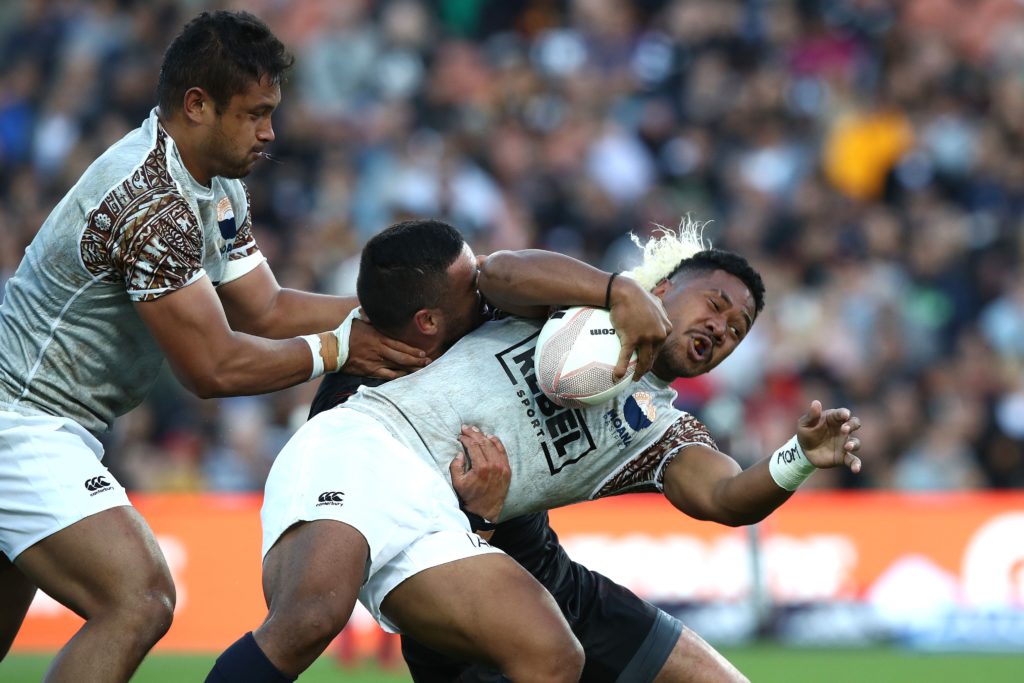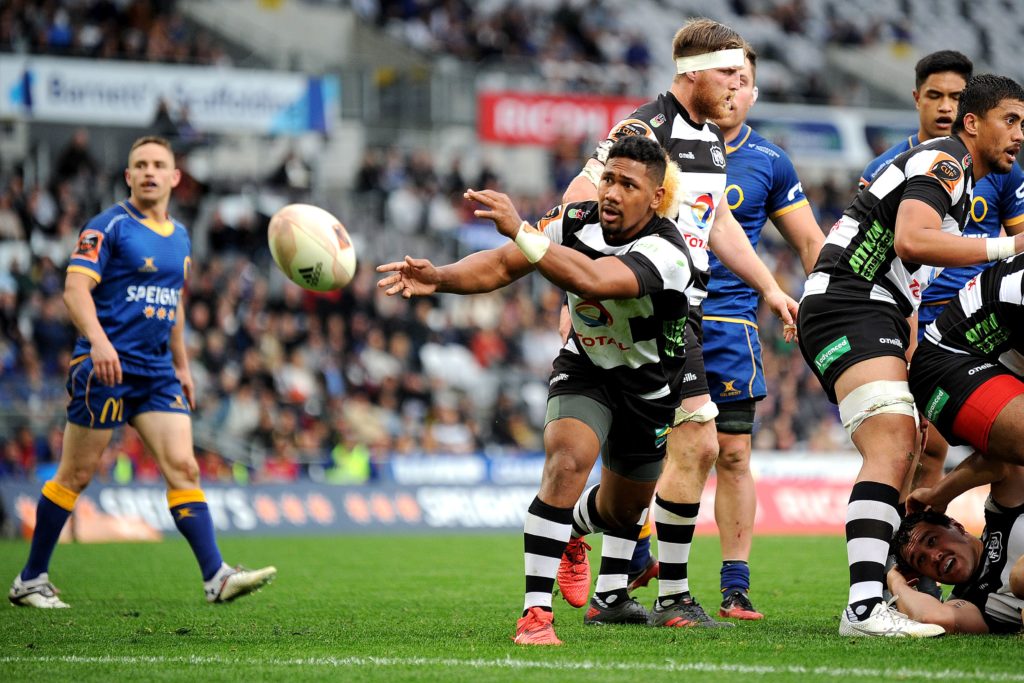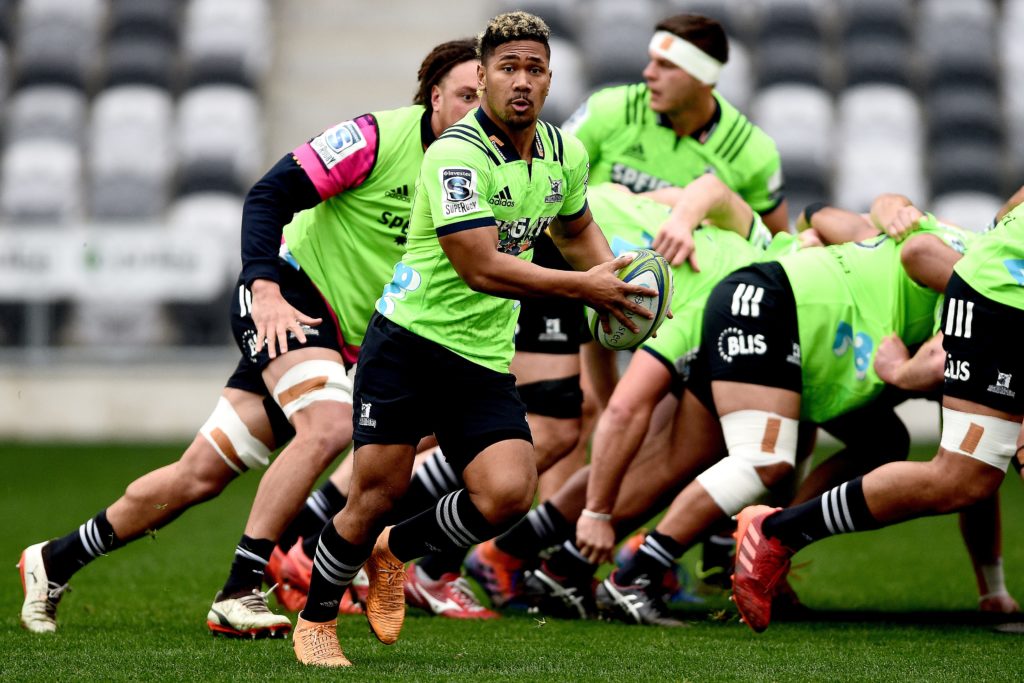In the second half of the recent entertaining and historic Maori All Blacks v Moana Pasifika match in Hamilton, during which the hastily-assembled Moana Pasifika side threatened to steal the match from their far more fancied opponents, former All Black flyhalf Lima Sopoaga sent a tweet.
It read: “Folau Fakatava is the future.”
The New Zealand Maori won the match 28-21 at Waikato Stadium but one of the stars of the game was Moana Pasifika’s 20-year-old scrumhalf, a muscular and combative player who only started playing rugby at high school and has a huge amount of potential.
Fakatava, a Tongan who spent his final two years of secondary education at Hastings Boys’ High School (he turned down other scholarship offers from Auckland schools King’s College and Aorere College), is on the cusp of a breakthrough after this year shining for Hawke’s Bay in the Mitre 10 Cup and again for Moana Pasifika in a match designed to highlight what the Pacific nations composite team could deliver in Super Rugby from 2022.
As it turned out they delivered quite a bit despite a lack of preparation time, and so did Fakatava. In fact, there was enough there to suggest he could be the one player who eventually succeeds where others have failed; that is, finally replacing the great Aaron Smith as the All Blacks’ first-choice scrumhalf.
Sopoaga, who played 16 tests, many outside Smith (and many more with Smith at the Highlanders, before his shift to club rugby in England), appears to think so and many others will point to Fakatava’s youth and ability to impose himself on games and come to the same conclusion.

Smith has reigned supreme since his test debut in 2012 and since that mid-winter night against Ireland at Eden Park has played 97 tests. His quickness of pass and ability to get to near endless rucks has allowed the All Blacks to play at a pace most nations struggled to match – at least until 2017, when the British and Irish Lions put the brakes on via a rush defence that everyone has since copied.
Still, Smith’s consistency and ability to improve and stay ahead of current All Black rivals TJ Perenara and Brad Weber even at the age of 32 will mark him as a true great. But all three scrumhalves – Perenara is 28, while Weber is 29 – are nearing the end of their test careers, and Fakatava is the one player in New Zealand with the strongest claim as Smith’s heir apparent.
Fakatava, the young man with the peroxide blond mullet, may indeed be the future, and as Ian Foster continues to build depth in his All Blacks squad ahead of the 2023 Rugby World Cup in France, that future could look a little clearer for Fakatava from next year.
For the last few seasons the scrumhalf position has been an area of mild concern for the All Blacks selectors – not for the quality of players currently in the mix, but for the shortage of players in the lower tiers of the game demanding the right to be noticed.
Chiefs halfback Te Toiroa Tahuriorangi, 25, played three tests in 2018 but hasn’t pushed on and even Weber, a quick scrumhalf in Smith’s mould who did some good things during last year’s Rugby World Cup, has failed to win the opportunities that he would have liked. Weber has played seven tests without a start.
For the last few seasons the scrumhalf position has been an area of mild concern for the All Blacks selectors – not for the quality of players currently in the mix, but for the shortage of players in the lower tiers of the game demanding the right to be noticed.
Perenara will play in Japan next year rather than for the Hurricanes, a short-term move which may suggest he is keen to cash in while his body allows him to. He did, however, reassure his supporters recently that he’s not done with Hurricanes or All Blacks just yet: “I just want to reiterate – it’s not the end of my time in New Zealand.”
All of which makes new Highlanders head coach Tony Brown’s job all the more difficult in 2021 because both Smith and Fakatava are Highlanders players (Fakatava has another year there after joining in 2019) and Brown must manage the expectations of the pair – the senior player and the increasingly confident young buck.
It is a task and responsibility that Brown, a former All Blacks flyhalf, hasn’t shied away from.
“One guy who I’ve really thought has been one of the best players in the Mitre 10 Cup has been Folau Fakatava,” Brown said after his squad was announced recently.

“I think, in 2021, he’s going to have a real impact on this team.
“I know we’ve got Aaron Smith as our All Black and our starting 9, but I think with the way Folau’s playing, he’s going to start to put a lot of pressure on Aaron Smith, and I think he’ll get a lot more game time, and potentially we might see him coming on at the back-end of games and being a real threat with ball in hand.”
All of New Zealand’s other franchises are likely to be interested if and when Fakatava comes off contract at the Highlanders but the neutral (or rugby romantic) would most likely hope he joins Moana Pasifika, the new team that would benefit most from his expertise. His performance against the Maori All Blacks also suggested that his attacking game and chemistry would be a perfect fit.
“I have one more year with the ‘Landers and we’ll see what happens from there,” Fakatava told the NZ Herald. “I’ll look around for somewhere I can play some footy but I don’t know yet.
“I didn’t get to play much with the ‘Landers but I learned a lot behind the world’s best halfback, especially with what he does off and on the field.
“It’s good to learn from Aaron but at the end of the day I need game time. You can’t argue with that because he’s the best but I’ll hang around next year and see what happens. They reckon they’ll give me more game time next year but we’ll see.”
Clearly there remain rough edges to Fakatava’s game. His passing could improve – but every scrumhalf would say the same thing and Smith still works as hard on that aspect of his game as he did 10 years ago.
It is his ability to influence games through his physicality which sets Fakatava apart. He is a genuine threat close to the line and, while all scrumhalves affect their teams via their force of personality, Fakatava’s is bigger than most.

That may be because he is playing for something bigger and more important than himself.
Two years ago, during his debut season for Hawke’s Bay, Fakatava’s parents’ home in Tonga was destroyed by Cyclone Gita.
Many young Pacific Islanders abroad in New Zealand or Australia have a desire to assist their families at home in a financial sense and for Fakatava his family’s need was bigger than for most.
“It’s my motivation,” Fakatava told Stuff last month. “Each time I feel [challenged] I won’t give up, I just think about my family and say a prayer that I can do it and keep going.”
It’s good to learn from Aaron but at the end of the day I need game time. You can’t argue with that because he’s the best but I’ll hang around next year and see what happens.
He arrived at Hastings Boys’ High with little English and left a hugely popular and engaging young man who helped the school’s first XV to two national finals (they won the competition in his last year in 2017). Fakatava also struck up a close understanding with first XV coach Mark Ozich, who became his coach at Hawke’s Bay.
It was during that debut season with the Magpies that Fakatava learned the Highlanders wanted him the next year and that he would be joining Smith, a player he idolised and may one day overtake.
“I always want to run the ball. When I see the opportunities I take them,” Fakatava said of his attacking mindset.
“I’m pretty confident in myself. I back myself.”


Comments
Join free and tell us what you really think!
Sign up for free